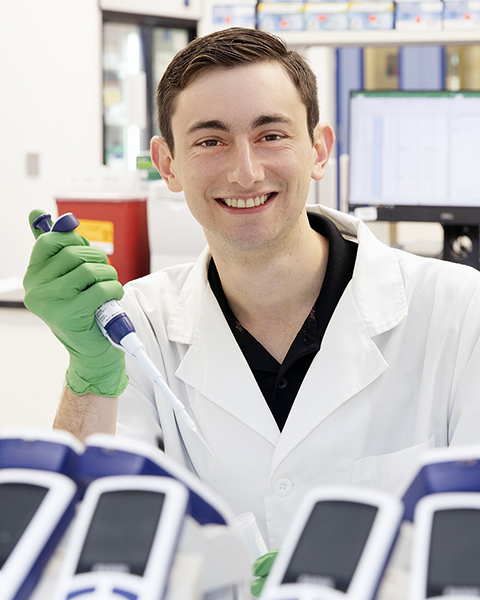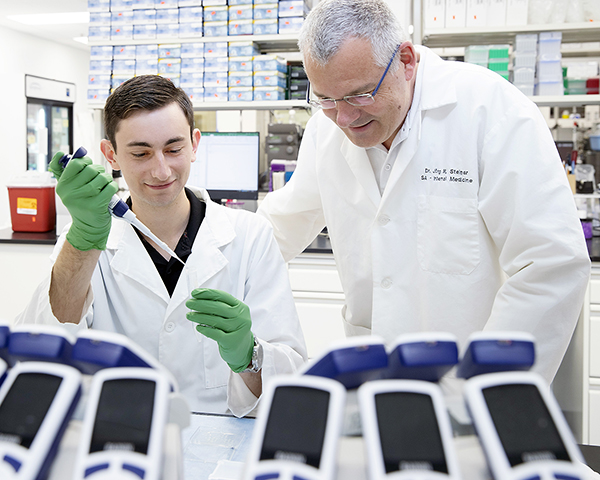Learning in the Lab
Story by Megan Myers, CVMBS Communications
The Texas A&M Gastrointestinal Laboratory has provided veterinary student Marshal Covin with opportunities to explore and expand upon his classroom studies.

Marshal Covin, a second-year veterinary student at the Texas A&M College of Veterinary Medicine & Biomedical Sciences (CVM), never expected a simple “howdy” to lead to countless opportunities for advancing his veterinary career.
But after introducing himself and striking up a conversation with an unfamiliar staff member, who turned out to be veterinary technician Chanel Reinertsen, Covin was encouraged to apply for jobs at the CVM and was soon employed at the Gastrointestinal Laboratory (GI Lab) as a junior biomedical sciences major.
“For about a year or so, I was a student worker there helping with service,” Covin said. “Veterinary clinics from around the world send fecal, serum, and other samples to the GI Lab, and I’d help them process it, put it where it’s supposed to be, answer phones, and things like that.”
Soon, Dr. Jörg Steiner, GI Lab director, distinguished professor, and Dr. Mark Morris Chair in small animal gastroenterology and nutrition, noticed Covin’s potential and requested his help on a research project. They began to develop a real-time polymerase chain reaction test to detect an especially elusive liver fluke called O. viverrini, a zoonotic parasite that can cause serious illness in animals and people.
“We extracted DNA from adult specimens of O. viverrini and chose a primer to target the gene we wanted, but we were unsuccessful in getting sufficient amplification of the DNA in our test,” Covin said. “Thus, more work is needed on the project.”
After that project was put on hold, Covin was moved to the research sector of the GI Lab and given his next project, for which he used analytical validation to prove that two new protein tests were as effective as the older version that took a far greater amount of time to run. These new tests detect C-reactive protein in dogs, a common marker for inflammation from various causes, including pancreatitis, parvovirus infection, and surgical trauma.
“These projects may help improve patient care for any clinic or lab that is looking to use either of these two tests to measure canine C-reactive protein,” Covin said.
“I got two abstracts out of it, which is really awesome,” he added. “I was fortunate enough to go to Seattle and present the first one at the Annual Forum of the American College of Veterinary Internal Medicine, and then Dr. Jonathan Lidbury presented the second at the European College of Veterinary Internal Medicine Congress in Rotterdam, the Netherlands, in Europe.”
Covin’s current project with Steiner involves studying blood serum to develop a new medication for Wilson’s Disease, a genetic disorder in people and dogs.
“It’s a copper-storage disease wherein people can’t excrete copper, so their liver ends up failing,” Covin said. “The current medication for it takes a year to work. This new one that we’re trying to work on takes potentially a week.”

Though Covin and Steiner have only worked on a few projects together, Covin said it has been fantastic having the opportunity to work in the GI Lab with CVM faculty members who enjoy mentoring students.
“I think we’re really fortunate here, because we have such wonderful faculty who are willing to take us under their wings,” he said. “Dr. Steiner has helped me in so many ways.”
Covin even had the opportunity to travel to Germany this summer with Steiner and two other CVM veterinary students. There, they studied pigs in an effort to develop a new pancreatitis treatment for humans.
“Besides the world-class mentorship I get from Dr. Steiner and Dr. Lidbury, I also get a ton of help from other GI Lab staff,” Covin said. “Our technicians, Ph.D. students, and supervisors are always eager to lend a helping hand, which is one of the things I love the most about the GI Lab.
“We definitely have a team-player mentality,” he said. “I can confidently say that none of my research would have been possible without their support and guidance.”
With three years left at the CVM, Covin has plenty of time to work on many more research projects with GI Lab faculty and staff members. As for now, he finds his past and present research projects to have been a very interesting part of his time at the CVM.
“They’re all really cool,” he said. “I can’t even pick a favorite. Each one has its own unique challenges.”
Even though Covin doesn’t plan to go into research after graduation, his experiences in the GI Lab will be beneficial when he is working as a mixed-practice veterinarian.
“As a general practitioner, having a background in research is really helpful because you can help enroll clients in clinical trials and keep up to date with the latest and greatest innovations,” Covin said. “But, at some point in the future, I might absolutely go back to academics or research.”
With the years of practical experience and the multitude of contacts with world-renowned experts Covin has gotten from his position in the GI Lab, who knows where the future will take him?
###
Note: This story originally appeared in the Fall 2019 edition of CVM Today.
For more information about the Texas A&M College of Veterinary Medicine & Biomedical Sciences, please visit our website at vetmed.tamu.edu or join us on Facebook, Instagram, and Twitter.
Contact Information: Jennifer Gauntt, Director of Communications, Texas A&M College of Veterinary Medicine & Biomedical Sciences; jgauntt@cvm.tamu.edu; 979-862-4216


